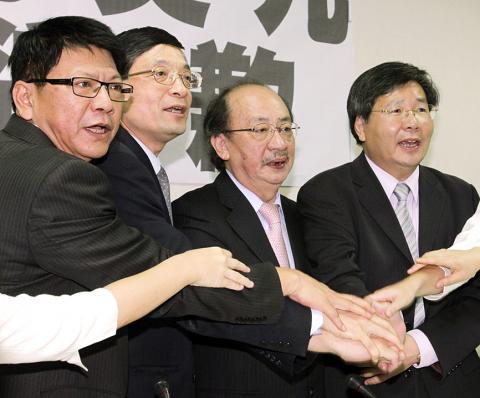With the approach of Tropical Storm Talim, lawmakers yesterday agreed to postpone a provisional session of the legislature to discuss a proposal to ease restrictions on imports of US beef containing ractopamine residue until next month.
Chinese Nationalist Party (KMT) caucus whip Lin Hung-chih (林鴻池) said the extra session, pushed for by President Ma Ying-jeou (馬英九), and initially planned for today and tomorrow, could be postponed until the middle of next month.
The proposal to levy a capital gains tax on securities investments and a confirmation vote on Premier Sean Chen’s (陳冲) nominations for the National Communications Commission (NCC) could also be placed on the agenda for the extra session, Lin said.

Photo: Wang Min-wei, Taipei Times
Legislative Speaker Wang Jin-pyng (王金平) called a meeting of party caucus representatives yesterday amid concerns that the legislature could get caught up in wrangling over the ractopamine issue when heavy rains are set to lash many parts of the nation.
Ma, who doubles as KMT chairman, had instructed the KMT legislators to call an extra session this week to vote on an amendment to Act Governing Food Sanitation (食品衛生管理法) that would ease the ban on ractopamine-tainted beef after the first session of the eighth legislature ended on Friday without passing the bill.
Although Ma was keen to see the bill passed, he is more worried about the effects of the weather systems, Wang said.
“President Ma is concerned about the expected heavy rainfall and the approaching storms,” Wang said.
“It will require further discussion among the ruling and opposition party caucuses to decide when to hold the extraordinary session,” the speaker said.
Wang said the legislators needed to return to their constituencies to help handle disaster preparedness and relief.
The opposition parties have criticized Ma for rushing to have an extra session to resolve the issue before the 35th session of the Codex Alimentarius Commission, which develops international standards for food, early next month because it is highly likely that the commission will once again reject the draft maximum residue levels for ractopamine.
The Democratic Progressive Party, the Taiwan Solidarity Union and the People First Party have demanded that the provisional session be held after the commission concludes its discussions of the matter at its annual session from July 2 to July 7 in Rome.
Executive Yuan spokesperson Hu Yu-wei (胡幼偉) on Sunday said the Cabinet “will not ease the ban on leanness-enhancer ractopamine with an administrative decree” before the legislature closes a provisional session.
The Executive Yuan said yesterday that it would respect Wang’s decisions on when to hold the extra session and what to put on the agenda.
If the provisional session was postponed, there was no reason not to wait until the one-month negotiation period ends on July 8 for a vote on a capital gains tax on securities transactions to be held and not to place a vote on the nominees for the National Communications Commission on the agenda, Wang said.
The four commission nominees are to replace four sitting members who are scheduled to complete their term of office and step down by the end of next month.
Additional reporting by CNA

Chinese Nationalist Party (KMT) Chairman Eric Chu (朱立倫), spokeswoman Yang Chih-yu (楊智伃) and Legislator Hsieh Lung-chieh (謝龍介) would be summoned by police for questioning for leading an illegal assembly on Thursday evening last week, Minister of the Interior Liu Shyh-fang (劉世芳) said today. The three KMT officials led an assembly outside the Taipei City Prosecutors’ Office, a restricted area where public assembly is not allowed, protesting the questioning of several KMT staff and searches of KMT headquarters and offices in a recall petition forgery case. Chu, Yang and Hsieh are all suspected of contravening the Assembly and Parade Act (集會遊行法) by holding

PRAISE: Japanese visitor Takashi Kubota said the Taiwanese temple architecture images showcased in the AI Art Gallery were the most impressive displays he saw Taiwan does not have an official pavilion at the World Expo in Osaka, Japan, because of its diplomatic predicament, but the government-backed Tech World pavilion is drawing interest with its unique recreations of works by Taiwanese artists. The pavilion features an artificial intelligence (AI)-based art gallery showcasing works of famous Taiwanese artists from the Japanese colonial period using innovative technologies. Among its main simulated displays are Eastern gouache paintings by Chen Chin (陳進), Lin Yu-shan (林玉山) and Kuo Hsueh-hu (郭雪湖), who were the three young Taiwanese painters selected for the East Asian Painting exhibition in 1927. Gouache is a water-based

Taiwan would welcome the return of Honduras as a diplomatic ally if its next president decides to make such a move, Minister of Foreign Affairs Lin Chia-lung (林佳龍) said yesterday. “Of course, we would welcome Honduras if they want to restore diplomatic ties with Taiwan after their elections,” Lin said at a meeting of the legislature’s Foreign Affairs and National Defense Committee, when asked to comment on statements made by two of the three Honduran presidential candidates during the presidential campaign in the Central American country. Taiwan is paying close attention to the region as a whole in the wake of a

OFF-TARGET: More than 30,000 participants were expected to take part in the Games next month, but only 6,550 foreign and 19,400 Taiwanese athletes have registered Taipei city councilors yesterday blasted the organizers of next month’s World Masters Games over sudden timetable and venue changes, which they said have caused thousands of participants to back out of the international sporting event, among other organizational issues. They also cited visa delays and political interference by China as reasons many foreign athletes are requesting refunds for the event, to be held from May 17 to 30. Jointly organized by the Taipei and New Taipei City governments, the games have been rocked by numerous controversies since preparations began in 2020. Taipei City Councilor Lin Yen-feng (林延鳳) said yesterday that new measures by